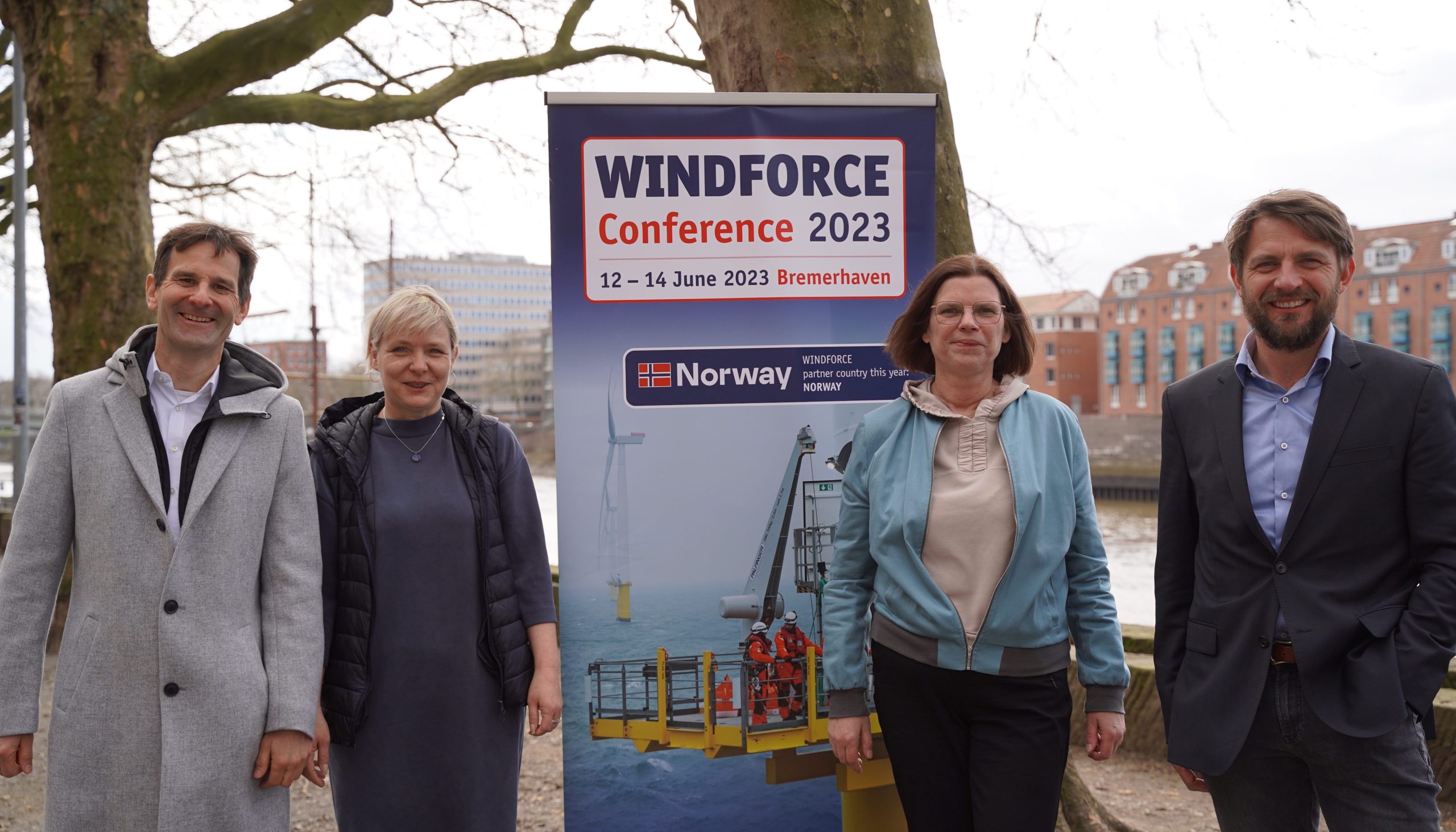Bremen, March 2023. 2023 is a decisive year for the offshore wind industry in Germany and across Europe. More than twice the amount of offshore wind power already installed has been put out to tender this year. According to the realisation agreement of the Federal Ministry of Economics and Climate Protection (BMWK), 50 gigawatts are to be connected to the grid by 2035 and at least four gigawatts are to produce green hydrogen in the North and Baltic Seas. It is not without reason that the Minister of Economics and Climate Protection, Dr. Robert Habeck, is the patron of the 20th WINDFORCE this year. This is where the international offshore wind supply industry meets. It is no coincidence that Norway is the country’s partner from 12 to 14 June, as there is far-reaching potential for cross-border cooperation.
On the occasion of the programme presentation of the most traditional international offshore wind conference, Kristina Vogt, Senator for Economics, Labour and Europe, and Heike Winkler, Managing Director of WAB e. V., spoke today about the prospects for the industry in Germany, Europe and of course for the state of Bremen. The programme items of WINDFORCE range from offshore wind turbine technology to the production of green hydrogen and the role of the maritime industry. Team Norway, representative of this year’s WINDFORCE partner country and one of the main sponsors, added the Scandinavian perspective to the discussion. Furthermore, Deutsche Windtechnik from Bremen also took part and reported from the perspective of one of the leading specialists for the maintenance of wind turbines on land and at sea worldwide.
Senator for Economic Affairs Kristina Vogt explained her view of Bremen’s role and the framework conditions for implementation: “The very ambitious goals for the expansion of offshore wind energy are both – an opportunity and a challenge for the industry. A major challenge will be the availability of skilled workers. Counteracting possible shortages of skilled labour at an early stage is the goal of the skilled labour strategy adopted by the Bremen Senate in January and the Campus for Education and Training for Transformation and Innovation in Climate Protection, for which up to 100 million euros are available. There, the skilled workers will be trained and further educated that we need for a climate transformation of the economy. In this way, we are also supporting the wind energy sector in a very concrete way.”
Heike Winkler, Managing Director of the industry association WAB e.V., sees the current situation as a historic opportunity: “The infrastructure needed for the energy transition goes far beyond power lines and hydrogen-capable gas pipelines,” she explained. Port and shipyard locations would take on strategic importance in order to combine climate protection with value creation and employment. To this end, Winkler emphasised the importance of the energy transition as a strong economic and employment driver and key to Germany’s security of supply. “We will be addressing all of this and the first steps towards a circular economy in the fishing port and look forward to this international industry exchange at the 20th WINDFORCE. We would already like to thank our host, the Heinrich Rönner Group, and our state partner,” she said, emphasising the importance of the trade conference, which is known as an international “class reunion” of the industry.
Achieving the goals will depend on how and on which topics companies cooperate nationally and internationally. For this reason, the WAB has already been focusing on country partnerships since 2019, such as this year’s with Norway. “We are very pleased to expand the cooperation with WAB e.V. and to present Norway as a partner country of WINDFORCE 2023. Especially in the future technologies offshore wind and hydrogen, there are many more opportunities for cooperation between the countries”, says Klaus Udesen, Director Offshore Wind NORWEP and representative of Team Norway. “Norwegian industry has great potential to support the energy transition: There are many smart and reliable solutions in the energy sector that have been tested for decades under the harshest conditions. Furthermore, Norway offers solutions for the challenges of the offshore industry with its existing and future port infrastructure,” adds Udesen.
Ultimately, the entrepreneurial perspective must not be missing from the analysis of the achievability of the expansion targets. The CEO of Deutsche Windtechnik Offshore, Carl Rasmus Richardsen, commented: “Deutsche Windtechnik has been growing steadily in the international offshore wind business for over a decade and is a central part of the value chain. We would like to continue our growth course from Bremen in the future and are therefore investing in the establishment of a training and further education academy. The region and its people can benefit in the best possible way if the state of Bremen actively supports us in the expansion. The Bremen training region can also be given pioneer status if we jointly find a state location for an offshore training turbine. That would be absolutely unique,” Richardsen emphasises.
More than 300 national and international experts, including from the conference partner country Norway, are expected at the Heinrich Rönner Group site for this traditional class reunion of the offshore wind industry. The conference consists of a central panel discussion, more than 30 expert lectures, keynotes, dinner speeches and start-up presentations. In total, conference participants can look forward to around 50 speakers sharing and contributing their expertise.



























